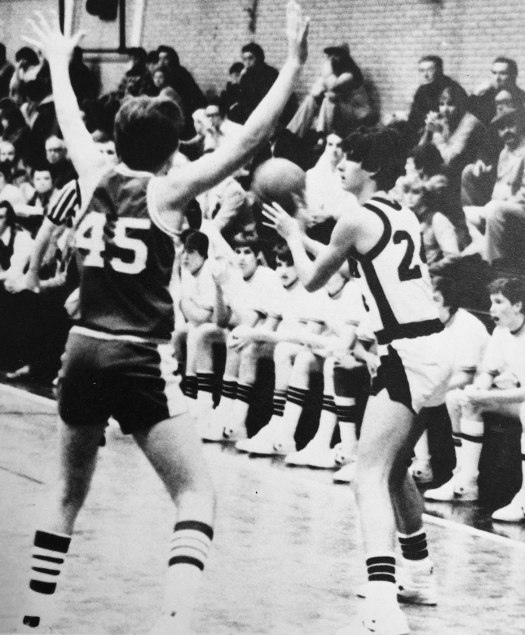Coach G. taught and motivated players on basketball’s big stage for 22 years, including one special season when his La Salle U. team ‘danced’ to the Sweet 16.
By Mark Vruno

As basketball season draws nearer, Fenwick alumnus John Giannini ’80 gets antsy. He hears the echo of his whistle and the orange, leather balls bouncing in the gym, but those sounds now are memories thumping in his head. It’s only natural because this past year marked the first time in 30 seasons that he was not coaching a college basketball team.
For 14 years (2004-18), Giannini, who was raised in Elmwood Park, IL, was head coach of the La Salle University men’s basketball team, an NCAA Division I program in Philadelphia. Giannini quickly turned the program around when, in his second year, the 2005-06 Explorers set a school record for Atlantic 10 Conference wins and tallied their first winning season in 13 years. Coach G. was named as a candidate for the National Coach of the Year. In 2011-12, La Salle won 21 games and was asked to participate in the National Invitational Tournament (NIT).

A year later, the Explorers punched a ticket to the lauded NCAA Tournament, where they were seeded 13th in their region. They defeated Boise State in the opening round, and then beat Kansas State and Ole Miss. The run ended in the Sweet 16, where La Salle fell to Wichita State. The team finished with a No. 24 national ranking in the USA Today Coaches Poll.
Before La Salle, Coach Giannini built up the program at Rowan University in New Jersey. He led the team to a pair of Division III Final Four appearances, in 1993 and 1995, before the “Profs,” as they are known, won the small-college national championship in ’96. Coach G. came to the NJ school in 1989 by way of the University of Illinois, where he served for two seasons as a graduate assistant on Lou Henson’s coaching staff. (The 1988-89 Fighting Illini (31-5) danced their way through the NCAA Tournament, past Syracuse and all the way to the Final 4 in Seattle.)
Following his success at Rowan, Giannini accepted the head coaching position at the University of Maine, where he stayed for eight years. Under him on the hardwood, the Black Bears enjoyed a 20-win season, which never had before happened, and then another. Giannini achieved the best career winning percentage in school history. Over the course of his 29-year collegiate head coaching career, he compiled an overall record of 508 victories and 375 defeats.
Coaching path

Coach and his wife, Donna, have two daughters, but Giannini grew up with boys. The oldest of four brothers, he is a “Double Friar,” playing football and basketball at St. Vincent Ferrer in River Forest before enrolling at Fenwick in 1976. “I looked up to Fenwick’s coaches and athletes,” Giannini recalls. As a 13-year-old, the late coach “George Badke met with me, and I felt like I was meeting George Halas.” (“Papa Bear” was, of course, coach/owner of the Chicago Bears.)
“People thought Fenwick was the best school academically in the area, but I was not a motivated student at all in grade school,” Giannini admits. Even in high school, he says, he was “clearly in the bottom half of my class. But I was far more prepared for college and life after than I ever realized.” Why? The coach points to two primary factors:
- “I had wonderful, passionate teachers at Fenwick.”
- “I also had really motivated, smart classmates, so I had to keep up!”
Most importantly, though, he believes, “Fenwick taught me how to live. We were encouraged to leave Fenwick with a philosophy of life at age 18. I knew what was important to me.”
Continue reading “Alumni Spotlight: John Giannini, PhD., Class of 1980”





